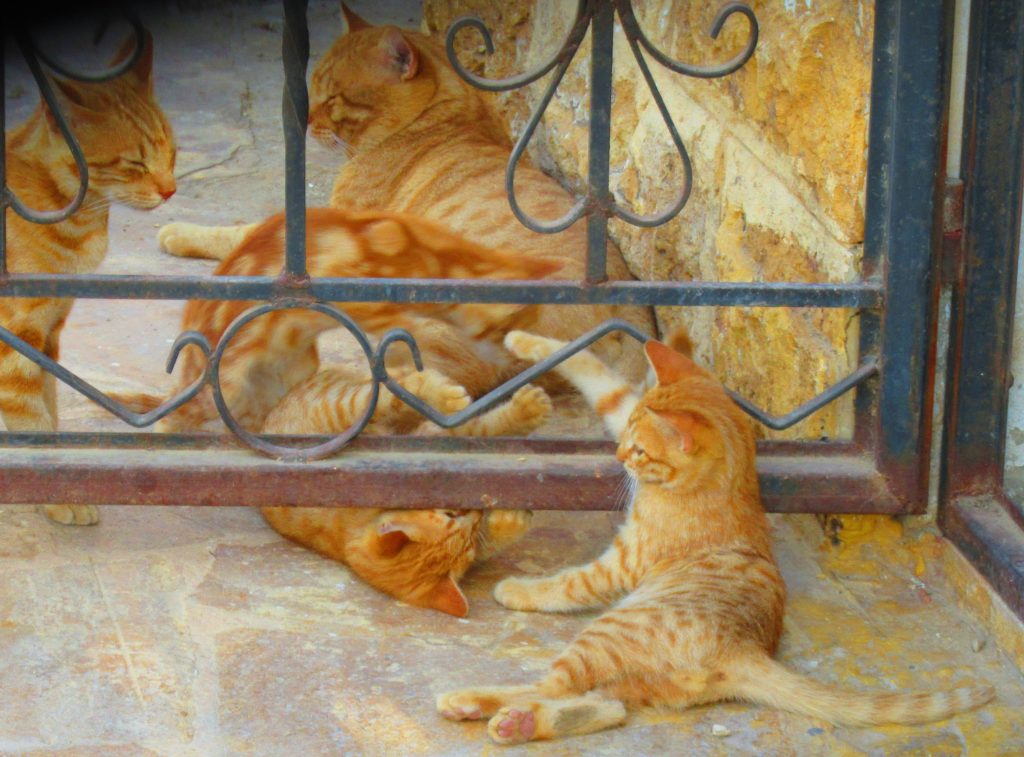Abroad on a dusky, late-summer evening, the creatively narrow and twisting streets of the ancient city outwitted the big bus we’d taken on a day trip, so we jumped off a ten-minute walk from our little hotel. We had barely noticed that we were walking alongside the wall of an Anglican compound when a gate opened up and a courtyard lured us in with its tumbling kittens beneath a dusty, thin tree. A woman crossing the quad to feed the cats mentioned that we would be welcome to join the congregation at prayer, except that it had just finished. I went back the next day, only partly to look for the kittens.
In the past few months, I have had the opportunity to visit a handful of churches spread across a handful of Anglican provinces. In all of my visits and prayers, no one asked my name.
In one, a casual inquiry as to the age of the building led to an intimate discussion of insurance claims and upkeep. The usher overlooked me while inviting each individual up to Communion, but the Senior Warden (identified during the mid-service announcements) offered a sympathetic smile as I slipped invisibly into the line in front of her.
On a fifth Sunday, I set out early down the narrow lane, but as its hedges hid every turn, I was almost running by the time the ancient ruins came into view, and I was a minute late. Reassured to see that others were still standing in front of the church, I soon discovered that this was because the doors were locked. A handwritten note was pinned to the outside: No service today. Fifth Sunday celebration with a bunch of other churches in another village nearby. Another couple arrived, apologizing, unlocked the doors, promised to update the website, apologized some more, and left for the other place. I walked back through the hedgerows and picked up the car.
The church hosting the joint service was packed. Ushers were pulling out folding chairs. As I walked in, the man who had unlocked the empty church, recognizing me across the crowd, jumped up and insisted I take the pew next to his wife, while he took a folding chair to the back.
Another church was all walls and little parking, and doors that took some tracking down. The person who handed me a booklet asked, “Are you familiar with the service?” I assured her that I was, and she smiled, nodded, and said no more. I sat in an empty pew. It may have been the seat of the person who slid in close behind me; but if so, nothing was said.
At the passing of the Peace, where no one knows what to do with strangers, a person a few pews away was flashing peace signs at friends and neighbors beyond arm’s reach. When he “peaced” me, I laughed as our eyes met, and returned the gesture in kind.
We seek out the company of one another, wherever we may be, because we cannot pass the Peace alone. Because the Sacraments are meant to be shared. Because love is communicated in company, with a word, or a gesture, or a look (or a pile of kittens).
It turns out that the rules for visiting churches and welcoming visitors is pretty familiar: Love God, authentically. Love your neighbour, your visitor, the stranger, as yourself.
The Revd Rosalind C Hughes is the Rector of the Church of the Epiphany in Euclid, Ohio. Having lived on three continents, she’s visited a few churches. Her blog, over the water, is at rosalindhughes.com. Her first book, A Family Like Mine: Biblical Stories of Love, Loss, and Longing, is scheduled for publication by Upper Room Books in April 2020.
This post has been edited.

